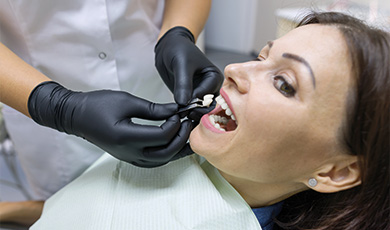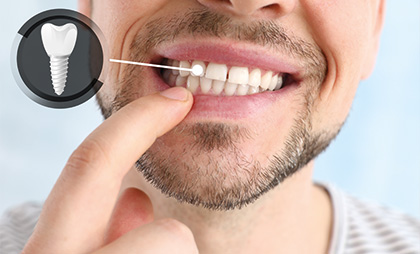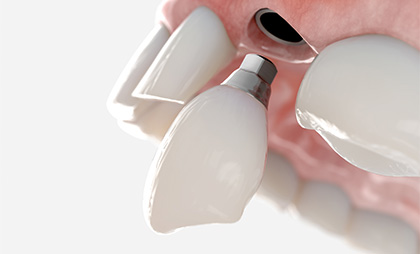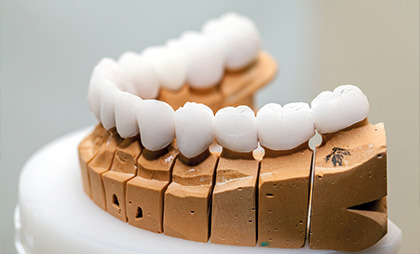Porcelain Crowns

WHAT IS A PORCELAIN CROWN TREATMENT?
Porcelain crowns, also known as all-ceramic crowns, are dental crowns that are made entirely of ceramic material. They can be an excellent alternative for patients looking for a natural dental restoration that lasts for a long time. Because they are made to reflect the appearance of natural teeth closely. Porcelain crown treatments are typically recommended for teeth that are highly visible, such as front teeth. As they provide excellent aesthetics and a natural appearance. They are also a perfect option for patients with metal allergies or sensitivities, as they do not contain any metal.Porcelain crowns are an excellent choice for patients with tooth decay and large fillings. Crowns treatments are as important as dental implants. Porcelain crowns provide you with; The good appearance that it gives. Stability and the comfortable feeling it brings. Better gum tissues and overall oral health.



ADVANTAGES OF PORCELAIN CROWNS
Porcelain crown treatments offer several advantages over other types of dental crowns. Some of the benefits of porcelain crowns include the following:
- Aesthetics: Porcelain crowns are highly aesthetic and can closely resemble the appearance of natural teeth. They are an excellent option for patients looking for a natural and long-lasting dental restoration.
- Biocompatibility: Porcelain is biocompatible. Meaning it is less likely to cause allergic reactions or sensitivity issues in patients with metal allergies or sensitivities.
- Durability: Porcelain crowns are strong and durable and can last many years with proper care and maintenance. They are not temporary crowns but rather permanent crowns.
- Reduced wear on opposing teeth: Porcelain crowns are less abrasive than metal crowns. It is less likely to wear down opposing teeth. Therefore, it helps to preserve the patient’s natural tooth structure, root canal, and gum line.
- Less heat and cold sensitivity: Porcelain crowns offer excellent insulation properties, reducing heat and cold sensitivity in chewing ice for patients.
- Stain resistance: Porcelain dental crowns are highly resistant to staining. This makes Porcelain crowns an excellent option for patients with color-matched issues. And patients with a history of tooth discoloration or staining to maintain natural color.
Overall, porcelain crown treatments are a good choice for most patients. They offer excellent aesthetic appeal, durability, and biocompatibility. Making them a perfect option for patients looking for natural teeth looking and long-lasting dental restoration.
WHAT ARE THE DIFFERENCES BETWEEN PORCELAIN CROWNS AND OTHERS?
There are several types of dental crowns, like zirconia crowns, each with its own advantages and weaknesses. Here are some of the critical differences between porcelain crown treatments and other types of crowns:
- Porcelain Crowns vs. Metal Crowns: Porcelain crowns are made entirely of ceramic material and do not contain any metal. On the other hand, metal crowns are made of gold, silver, or other metal alloys. Porcelain dental crowns provide excellent aesthetics and a natural appearance, while metal crowns are known for their strength and durability.
- Porcelain Crowns vs. Porcelain-Fused-to-Metal (PFM) Crowns: Fused-to-metal crowns have a metal base covered with a layer of porcelain. Which provides a natural appearance. Porcelain crowns, on the other hand, are made entirely of ceramic or porcelain. Porcelain crowns offer excellent aesthetics, while PFM crowns balance strength and aesthetics.
- Porcelain Crowns vs. Zirconium Crowns: Zirconium crowns are made of a strong and durable ceramic material called zirconium. They provide excellent strength and durability but may offer a different level of aesthetics than porcelain crown treatments.
- Porcelain Crowns vs. Composite Resin Crowns: Composite resin crowns are made of a tooth-colored composite resin material. They provide excellent aesthetics but may not be as durable as porcelain crowns.
Overall, visiting your dentist can assist you in deciding the ideal crown type for your requirements. Nevertheless, there are some factors that will determine the kind of dental crowns that are advised. Such as:
- The tooth’s position.
- The degree of tooth decay or tooth damage.
- The patient’s preferences.
- Crowns cost and the patient’s financial situation.




- Category
- DENTAL CARE


